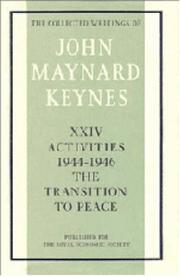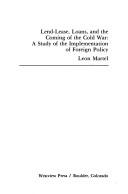| Listing 1 - 10 of 26 | << page >> |
Sort by
|
Book
Year: 1944 Publisher: New York : Pocket Books,
Abstract | Keywords | Export | Availability | Bookmark
 Loading...
Loading...Choose an application
- Reference Manager
- EndNote
- RefWorks (Direct export to RefWorks)
Book
Year: 2017 Publisher: [Place of publication not identified] : Great Neck Publishing,
Abstract | Keywords | Export | Availability | Bookmark
 Loading...
Loading...Choose an application
- Reference Manager
- EndNote
- RefWorks (Direct export to RefWorks)
Book
Year: 2017 Publisher: [Place of publication not identified] : Great Neck Publishing,
Abstract | Keywords | Export | Availability | Bookmark
 Loading...
Loading...Choose an application
- Reference Manager
- EndNote
- RefWorks (Direct export to RefWorks)
Book
Year: 2017 Publisher: [Place of publication not identified] : Great Neck Publishing,
Abstract | Keywords | Export | Availability | Bookmark
 Loading...
Loading...Choose an application
- Reference Manager
- EndNote
- RefWorks (Direct export to RefWorks)
Book
ISBN: 142143072X 1421430711 142143105X Year: 2019 Publisher: Johns Hopkins University Press
Abstract | Keywords | Export | Availability | Bookmark
 Loading...
Loading...Choose an application
- Reference Manager
- EndNote
- RefWorks (Direct export to RefWorks)
Originally published in 1969. In The Most Unsordid Act, Warren Kimball provides a history of the Lend-Lease idea. The genesis and development of the Lend-Lease idea, although spanning less than two years, offers a subject of the broadest significance for major questions of democratic government and society. The story begins with the United States' growing recognition of the British monetary and gold shortage and ends with the passage of the Lend-Lease Act and the American commitment that it involved. Dr. Kimball's narrative—chronological, detailed, and dramatic—includes analyses of the domestic and international concerns on both sides of the Atlantic and of the roles of the leading protagonists: President F. D. Roosevelt and Treasury Secretary Morgenthau, as well as Stimson, Hull, Churchill, and key British representatives. He also examines the possibility that Lend-Lease was designed to benefit the American economy at Britain's expense. A central question animates Kimball's account: How could a president who recognized the ultimate threat of Nazi Germany, but shared his nation's desire to avoid war, find a way to help an ally? The portrait of Roosevelt that emerges is instructive in view of revisionist histories that present him as a Machiavellian figure disingenuously leading his country to war. Kimball sees him, rather, as an essentially domestic president whose experiences and interests evolved from national concerns—as a man unschooled in international affairs, eager to avoid confrontation with his congressional opposition, wary of the British penchant for power politics, given to procrastination when faced with difficult problems, and anxious to avoid full-scale war. Yet, the administration's legislative strategy and the debate over the Lend-Lease Act clearly demonstrated that the president, his closest advisers, and the Congress were aware that the legislation would inevitably mean war with Germany. Based on such sources as the diaries of Morgenthau, the State Department Archives, Foreign Economic Administration records, the Stimson papers, and interviews with participants, this study provides insights that raise central questions about the functioning of the American system of government.
Lend-lease operations (1941-1945) --- United States --- Politics and government --- Lease-lend operations --- World War, 1939-1945 --- Economic assistance --- Lend-lease operations --- Economic aspects --- Equipment and supplies --- Finance --- History of the Americas

ISBN: 1139520172 0521220173 1107681154 Year: 2013 Publisher: Cambridge : Cambridge University Press for the Royal Economic Society,
Abstract | Keywords | Export | Availability | Bookmark
 Loading...
Loading...Choose an application
- Reference Manager
- EndNote
- RefWorks (Direct export to RefWorks)
In this volume, the third of three concerned with Keynes's involvement in the problems of financing Britain's war effort after 1939, the concentration is on the final stages of lend lease and the negotiations with the United States for the transition to peacetime conditions and the 1945 loan to Britain.
Business & Economics --- Economic Theory --- World War, 1939-1945 --- Reconstruction (1939-1951) --- Lend-lease operations (1941-1945) --- Finance --- Lease-lend operations --- Economic assistance --- Lend-lease operations --- Economic aspects --- Equipment and supplies

ISBN: 0891584536 Year: 1979 Publisher: Boulder (Colo.) : Westview Press,
Abstract | Keywords | Export | Availability | Bookmark
 Loading...
Loading...Choose an application
- Reference Manager
- EndNote
- RefWorks (Direct export to RefWorks)
Lend-lease operations (1941-1945). --- World War, 1939-1945 --- Influence. --- United States --- Soviet Union --- Foreign relations
Book
Year: 1952 Publisher: Washington, D. C. : Office of the Chief of Military History, Department of the Army,
Abstract | Keywords | Export | Availability | Bookmark
 Loading...
Loading...Choose an application
- Reference Manager
- EndNote
- RefWorks (Direct export to RefWorks)
World War, 1939-1945 --- Lend-lease operations (1941-1945) --- United States. --- History
Book
ISBN: 9780748649730 0748649735 9780748647477 0748647473 0748693807 1299735746 Year: 2013 Publisher: Edinburgh : Edinburgh University Press,
Abstract | Keywords | Export | Availability | Bookmark
 Loading...
Loading...Choose an application
- Reference Manager
- EndNote
- RefWorks (Direct export to RefWorks)
Aircraft were at the heart of British supply diplomacy with the United States in the Second World War and were at the forefront of the Roosevelt administration's policy of aiding the Anglo-French alliance against Germany. They were the largest item in British purchasing in the US in 1940, a key consideration in the Lend-Lease of 1941 and a major component of several wartime conferences between Churchill and Roosevelt. Through a series of case studies, Gavin J. Bailey reveals new details of how Britain used American aircraft and integrates this with broader British statecraft and strategy. He challenges conceptions that Britain was strategically reliant on the US and reveals a complicated, asymmetrical interdependency between the wartime allies.
Lend-lease operations (1941-1945) --- Aeronautics, Military --- Aeronautics and state --- Military aeronautics --- Military aviation --- Military art and science --- Air pilots, Military --- Lease-lend operations --- World War, 1939-1945 --- Economic assistance --- Aeronautics --- Aviation policy --- State and aeronautics --- Equipment and supplies --- History --- Lend-lease operations --- Economic aspects --- Finance --- Government policy --- Great Britain. --- RAF (Royal Air Force) --- R.A.F. --- Royal Air Force (Great Britain) --- Procurement --- History.
Multi
ISBN: 0521220165 1107653207 1139520164 9780521220163 9781139520164 9781107653207 Year: 1979 Volume: 23 Publisher: London: MacMillan,
Abstract | Keywords | Export | Availability | Bookmark
 Loading...
Loading...Choose an application
- Reference Manager
- EndNote
- RefWorks (Direct export to RefWorks)
This volume, the second of six concerned with the Second World War, provides an account of Keynes's contributions to the solution of Britain's wartime external financial problems between 1940 and 1943. It focuses particularly on his involvement in discussions, both in Whitehall and in Washington, concerning the operation of the Lend Lease Agreement and the terms of post-war economic co-operation under Article VII of that agreement. However, it also includes records of his discussions with American economists on the finance of the American defence effort in 1941 and his growing concern with Britain's increasing problem of overseas indebtedness in the sterling area.
Polemology --- Economic schools --- World War, 1939-1945 --- Finance --- 330.8 --- 336.5 --- 330.81 --- Economisch denken. Economische scholen. Economische theorieen --- Overheidsuitgaven. Openbare financien. Staatsuitgaven. Lopende staatsuitgaven --- Voorlopers van Adam Smith. Mercantilisme. Colbertisme. Fysiocraten. Kameralisme --(economisch denken) --- 330.81 Voorlopers van Adam Smith. Mercantilisme. Colbertisme. Fysiocraten. Kameralisme --(economisch denken) --- 336.5 Overheidsuitgaven. Openbare financien. Staatsuitgaven. Lopende staatsuitgaven --- 330.8 Economisch denken. Economische scholen. Economische theorieen --- Lend-lease operations (1941-1945) --- Lease-lend operations --- Economic assistance --- Lend-lease operations --- Economic aspects --- Equipment and supplies
| Listing 1 - 10 of 26 | << page >> |
Sort by
|

 Search
Search Feedback
Feedback About UniCat
About UniCat  Help
Help News
News